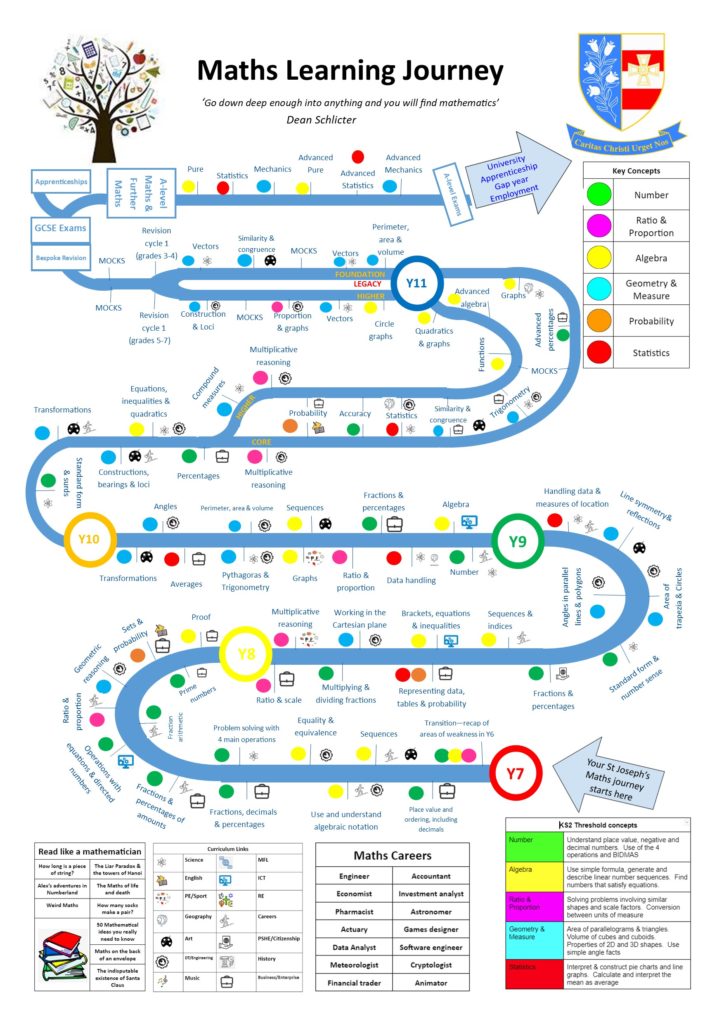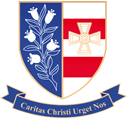Mathematics
What is maths? The Oxford dictionary definition tells us it is ‘the abstract science of number, quantity and space…’ At its heart mathematics is the language used to explain how the world works. Dean Charles Schlicter (Wisconsin University, 1920s) quoted ‘Go down deep enough into anything and you will find mathematics.’

Too often mathematics is viewed as a skills acquisition; can you find the missing angle?; can you factorise a quadratic? Can you find the volume of the sphere? Yes, we need these skills to be successful mathematicians but the ultimate aim is to be able apply the skills and knowledge acquired in order to think logically and solve problems. Maths allows us to develop a disciplined approach to problems.
Key Stage 3 Maths
In key stage 3 we aim to build upon the skills and knowledge pupils acquired in key stage 2. Across the 2 week timetable pupils will receive 8 hours of maths teaching. During this time they will further develop their numeracy skills, problem solving and analytical skills. Pupils are given opportunities to strengthen and deepen their understanding of mathematics. These opportunities include the UKMT maths challenge and Team events, as well as working in partnership with AMSP to provide problem solving workshops for pupils in years 8 and 9.
| Cycle 1 | Cycle 2 | Cycle 3 | |
| Year 7 | Y7 C1 KO.pdf | Y7 C2 KO.pdf | Y7 C3 KO.pdf |
| Year 8 | Y8 C1 KO.pdf | Y8 KO C2.pdf | Y8 KO C3.pdf |
| Year 9 | Y9 C1 KO.pdf | Y9 C2 KO (2).pdf | Y9 C3 KO.pdf |
Key Stage 4
At St Joseph’s we use the OCR exam board for mathematics and there are two tiers of entry – foundation and higher. Through the use of past papers as key tasks our pupils are well practised with the style of questions the exam board uses. Pupils in Year 10, other than those in set 1, are following a core scheme of learning, allowing all pupils access to some elements of both higher and foundation topics. This will enable staff to ensure that pupils are entered for the most suitable tier in order for them to achieve their best grade.
| Cycle 1 | Cycle 2 | Cycle 3 | |
| Year 10 Higher | Y10H C1 KO.pdf | Y10H C2 KO.pdf | Y10H C3 KO.pdf |
| Year 10 Core | Y10C C1 KO.pdf | Y10C C2 KO.pdf | Y10C C3 KO.pdf |
| Year 10 Foundation | Y10F C2 KO.pdf | Y10F C3 KO.pdf | |
| Year 11 Higher Set 1 | Y11H Set 1 C1 KO.pdf | Y11H Set 1 C2 KO.pdf | |
| Year 11 Higher Set 2 | Y11H Set 2 C1 KO.pdf | Y11H Set 2 C2 KO.pdf | |
| Year 11 Foundation | Y11F C1 KO.pdf |
Maths Learning journey

Homework
Throughout each cycle pupils are set homework once per week on SPARX. These are set every Monday to be completed on the following Monday. These homework tasks are linked to the curriculum content as well as retrieval. Through retrieval tasks, which are also incorporated into lessons, pupils should have a deeper understanding of these skills and in an assessment should be able to recall them easier.
Revising for Maths
Regularly we hear the phrase ‘how do you revise for maths?’ There is no one correct way to revise for maths but the best way is to just do it! Encourage your child to try lots of different ways to revise for maths then the method(s) that works best for them. Suggested ways to revise are:
* Make revision posters/mind maps
* Use a textbook/revision workbook for practice questions
* Practise past papers
* Covering the answers while re-trying a question (look/cover/check)
* Find a revision buddy who you can work with
* Make flash cards
* Learn formulae and important information/facts
* Go online
Useful websites:
* SPARX Maths https://stjca.sparxmaths.uk/student
All students have their own unique login and choose their own password.
* Corbett Maths corbettmaths.com
This is a free to use website with a vast array of maths topics. Each topic contains a how to do video, practice textbook questions and exam style questions.
* BBC Bitesize bbc.com/bitesize
This website is free to use and has many activities to aid your child.
* Maths Made Easy mathsmadeeasy.co.uk
* Seneca senecalearning.com/en-GB
Pupils create their own accounts for Seneca and reset their own passwords.
* onmaths.com Online access to exam style questions and more
Pupils create their own accounts for OnMaths and reset their own passwords.
Key Stage 5:
Both the mathematics and further mathematics courses build upon the mathematics students have studied at GCSE. Students will follow the Edexcel syllabus in both Mathematics and Further Mathematics. Both courses are 2-year linear courses, examined externally at the end of Year 13.
What does the course cover?
During this course you will learn to extend your knowledge of algebra, geometry and handling data from GCSE and explore the ways in which mathematics can be applied in the real world.
Pure mathematics: Some of the new topics studied are coordinate geometry, series, calculus and numerical methods. These topics have a high algebraic content and they are an excellent introduction to mathematics at undergraduate level. Branching further into pure mathematics, students will study topics such as logarithms & exponentials, radian measure and modelling with vectors.
Mechanics and Statistics: The applied content of the course introduces students to modelling, visualising situations and the mathematical forces that are in action. Using statistics, you can solve more complex problems based around probabilities, testing hypotheses and using a large data set.
The further mathematics course follows Edexcel entry route C. This route covers all content included in the mathematics course, in addition to a wide variety of further pure mathematics and mechanics concepts.
Further mathematics introduces new topics such as matrices and complex numbers – topics which form the basis of all undergraduate studies. Students who select further mathematics usually go on to study the subject at university.
A-Level Maths Learning Journey
Further Maths Learning Journey
These documents give a more detailed insight to the topics studied in each module.
How is the course assessed?
The A level mathematics course is assessed via 3 written examinations taken at the end of the 2-year course. Papers 1 and 2 cover the entire pure mathematics syllabus with Paper 3 examining applied mathematics. Each paper is worth 100 marks and lasts 2 hours.
The further mathematics course is assessed by means of 4 written papers taken at the end of the 2-year course. Each is 1 hour 30 minutes in length and worth 75 marks. Papers 1 and 2 cover the core content of the course with papers 3 and 4 covering further concepts in pure mathematics and mechanics separately.
When preparing for key tasks, mocks and final assessments pupils have access to Integral Maths as well as free online access to Exam Solutions.
What are the entry requirements?
Mathematics is widely regarded as a challenging A-Level. The course begins with the study of algebraic concepts at grade 7 GCSE level and progresses quickly. For this reason, a Grade 7 at GCSE is advised for Mathematics and a Grade 8/9 for Further Mathematics. This bridging course will support your transition from GCSE to A-level Maths. Please complete before your first lesson in September.
What do students who study this course go on to do?
Mathematics is essential for studying the subject itself as well as physics or engineering at university, and for these subjects, further mathematics is highly desirable or even essential at the top institutions. Other courses which benefit from mathematics A-Level include medicine, economics, accounting and other sciences.
KS5 Enrichment
New for this academic year, 2022 – 2023, we are offering pupils in Year 12 Level 3 Mathematical Studies, route 2A. This looks at the practical applications of statistics and other elements of maths used in everyday life, such as student loans and tax. This will be assessed at the end of Year 13 with 2 examinations.
Further information can be found here.
To help support pupils in their independent learning they have access to Integral Maths, via a unique login and password.


